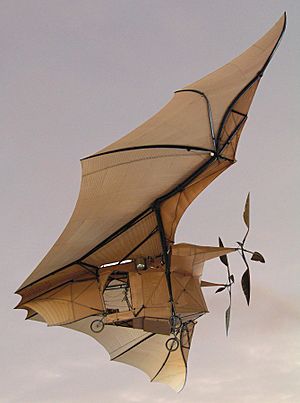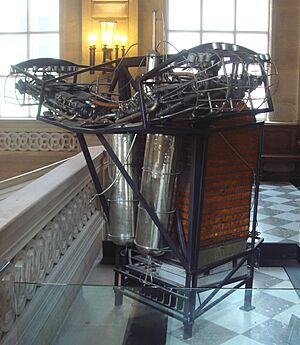Ader Avion III facts for kids
class="infobox " style="float: right; clear: right; width: 315px; border-spacing: 2px; text-align: left; font-size: 90%;" ! colspan="2" style="text-align: center; font-size: large; padding-bottom: 0.3em;" | Avion III |-
|- | colspan="2" style="text-align: center;" |  |- |colspan="2" style="border-bottom: 1px solid #aaa;text-align:center;" |Avion III (photo edited to show in flight) |-
|- |colspan="2" style="border-bottom: 1px solid #aaa;text-align:center;" |Avion III (photo edited to show in flight) |-
! Role | Experimental monoplane |- ! National origin | France |-
! Designer | Clément Ader |-
! First flight | 14 October 1897 (hops) |-
! Number built | 1 |-
! Developed from | Avion II |-
|}
The Avion III was an early aircraft built by a French inventor named Clément Ader. He worked on it between 1892 and 1897. The French army helped pay for its development. This aircraft was special because it was powered by a steam engine, which was a common type of engine at the time.
The Avion III looked a lot like a bat, just like Ader's earlier plane, the Éole. It had two steam engines, which powered two propellers to push it forward. Unlike his first plane, the Avion III had a rudder. A rudder is a movable part that helps steer the aircraft.
Contents
Trying to Fly: The First Tests
Tests for the Avion III began on October 12, 1897. This happened at an army base called Satory, near Versailles in France. The aircraft moved along a circular track on the ground.
On October 14, 1897, something exciting happened. The Avion III lifted off the track for a short distance. It turned halfway around before stopping. Clément Ader later said that the plane flew about 100 meters (328 feet) that day. He even claimed to have two people who saw it happen.
However, the French military was not very impressed with what they saw. They decided to stop giving Ader money for his aircraft projects.
Where Is the Avion III Now?
Today, the Avion III is kept safe at the Musée des Arts et Métiers in Paris, France. This is a museum of arts and crafts. The aircraft was carefully fixed up and restored in the 1980s so people can still see it.
Key Features of the Avion III
The Avion III was quite large for its time. It had a wingspan of 16 meters (about 52 feet). Its wings covered an area of 56 square meters (about 600 square feet). When empty, the aircraft weighed around 400 kilograms (about 880 pounds).
It was powered by two special steam engines designed by Ader himself. Each engine could produce about 15 kilowatts of power. These engines turned four-bladed propellers, which were shaped like sails. The design aimed to make the aircraft light enough to fly.
Gallery
See also
 | George Robert Carruthers |
 | Patricia Bath |
 | Jan Ernst Matzeliger |
 | Alexander Miles |





